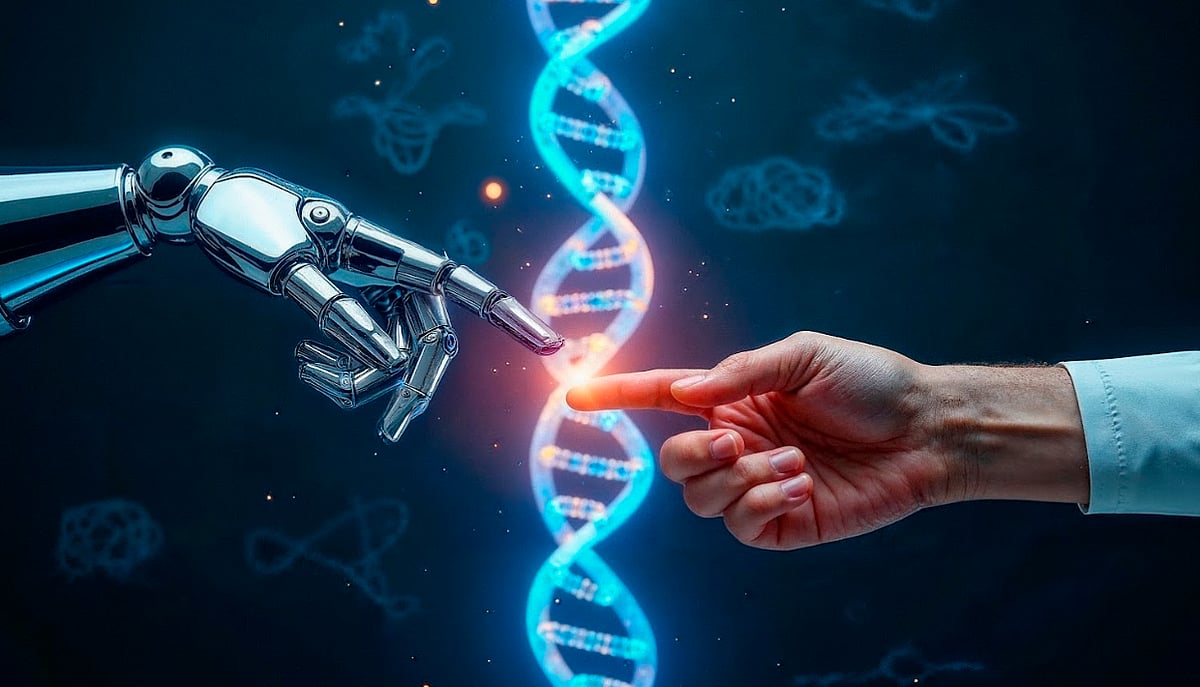To start with the reasons behind this discussion on Genomics, Prime Minister Narendra Modi has expressed clear enthusiasm about it, particularly through India’s landmark Genome India Project in January 2025 a massive effort that sequenced 10,000 Indian individuals to understand the genetic landscape of India. In the same speech, he highlighted the bioeconomy’s rise from $10 billion in 2014 to over $150 billion by 2025 and referred to Genome India as a pillar of India emerging as a global pharma and biotech solutions hub.
We have very limited access and facilities, such as NIV Pune for Viral Genomics to tackle pandemics, while India is one of the most genetically diverse populations in the world. At the same time, non-communicable diseases are costing the country trillions of dollars. The country has aligned genomics with India’s biotech and bioeconomy goals; hence, the bioeconomy grew 15x from 2014 to 2025 from ₹10 lakh crore to $150 billion.
And there is a need to have our very own:
Indian Reference Genome
Indian Rare Disease Support
India Health Policy Tools
India Drug Response Mapping
India Next Generation Research
Export India Genomics Services Globally
All About Genomics
To explain genomics in simple terms and its importance genetics as a scientific field comes from the work of Gregor Mendel in the 19th century. The term ‘Genetics’ was introduced by English biologist William Bateson in 1905. He became a champion of Mendel’s principles of inheritance.
An entire set of a person’s genes forms their Genome the blueprint of their life. Genomics is the study of all known genes that make up DNA, which you see in pictures as the coiled ladder. It’s like a set of 26 alphabets, and one gene is one letter.
We’ve identified around 25,000 protein-coding genes, composed of approximately three billion base pairs yet that’s less than 2% of one’s entire DNA. Astonishingly, if uncoiled, the DNA packed in a single cell stretches six feet long, yet remains unseen to the naked eye.
Simply said, “One gene codes for one protein.” These proteins make a living organism. Everything about us eye pigment, hair colour, height, dopamine levels, even athletic potential is coded by our genes. Genomics can track predispositions to disease, help diagnose infections, and even trace ancestry.
Hot topic in science
Genomics is now the most developing and essential field of science, as Genetics helps us tailor treatments and lifestyle changes to each individual. One Genome does not represent all. Each individual is different, even twins. Hence, it has become a major talking point in science and medicine recently, especially for assessing disease risk and personalising treatments and enhancing quality of care.
For example, in a NIPT Test, we can take a blood sample from the mother's arm vein at the 10th week, isolate the Baby’s free floating fetal DNA without any invasive womb techniques and screen for congenital diseases, while the science of pharmacogenomics helps customise treatments. Moreover, science has now progressed to Gene Editing and Gene Therapy, which will revolutionise healthcare in the near future.
Gene editing or genome editing is a powerful tool with wide-ranging applications in medicine, agriculture, and research. It allows scientists to make precise changes to an organism’s DNA, offering potential solutions for genetic diseases, improving crop yields, and developing new disease models.
Healthcare, India and, Genomics
Genomics is not restricted to clinical care per se i.e. not just for predicting disease risk, guiding treatment decisions, and personalising healthcare. It is now increasingly used and incorporated into allied aspects of healthcare and research to consumer products, and even medical law enforcement. As we know, DNA is unique for every individual. DNA Tests are used in legal forensics and police investigations. It is a reliable method for establishing biological parentage. Moreover, genomics plays a role in understanding human evolution, population history, and even influences personal choices and behaviours and can be used in product development and marketing strategies.
AI in healthcare
AI is universal and useful to all in the entire healthcare ecosystem. It can not only analyse MRI and CT scan X-Ray but detect diseases such as cancer or eye disorders faster but also more accurately than human clinicians. AI applications and Tools are used to identify abnormalities early and a useful guide in proactive personalised treatment options, monitor, support patients more accurately 24/7, facilitate remote access, reduce burden on systems, provide reminders and notifications, manage administrative tasks and save lives.
Additionally, AI assists doctors with medical note records and helps in managing appointments, while accelerating drug discovery, simulating real-time processes, aiding in vaccine development, population studies and aiding in proactive and preventive care to save costs and time. It can help one and all healthcare stakeholders, including policy makers and data managers and provide international information at a fingertip. Thus, AI increasingly provides better outcomes, cost efficiency, relevant access, speedy innovation, monitors security, confidentiality, trust, equity and ethical care and provides the latest advances and information exchange at a global level.
AI in Indian Healthcare
AI can reduce gaps in remote access and care, make care more affordable and improve the quality of care. AI can improve caregiver and patient engagement. It can even partly replace staff with bots, provide virtual services in rural and remote areas where healthcare staff is scarce, optimise resource allocation, triage, screening and tracking cases, facilitate education, boost R&D, etc. The list is endless with a cohort of opportunities in employment, projects, investments and improved ROIs.
There are government initiatives such as Ayushman Bharat Digital Mission, State-level Government Health Insurance Schemes, Genome India Project, vaccination drives and disease-specific missions, India AI Mission, National Health Stack and research promotion and several other Start-up schemes.
Private players have a distinct international advantage and new entrants in remote access through digital networks, digital models like Lybrate, home care services, HealthifyMe, 1Mg, along with modern hospital chains such Cloud-Nine, Max, Fortis, Apollo and Vedanta and genetic labs like MedGenome, GeneScope and Strand, foraying into lifestyle Genomics besides clinical Genomics and research and data analytics to improve care delivery.
India has a long way to go and scale up its R&D facilities, medical judiciary and regulatory mechanism to match global standards, international brands, care services, better equitable health insurance and a healthcare delivery system by minimising disparity in care at government and private hospitals to achieve best practice at utmost level. Notably, the Indian government spends a much smaller % of GDP on health care and R&D compared to many other countries.
Future of the health business
Awareness of good health in the public, improved services at all levels, increasing life expectancy as a result, medical tourism and the introduction of digital technology are on the rise in India and are a good indicator of a promising future. In general, the healthcare business is rising at an international level, and with cross-border information and experience exchange is helping the Indian scenario even more so.
Allied digital / Telemedicine / AI / ML/ Robotics / IoTs and Wearable devices/ blockchain- based services, including an increase in life science services such as Genomics, stem cell science, and the holistic advantage of AYUSH services, are a value addition to the system. Also, the doctor-patient ratio is being addressed methodically with increased and improved medical education facilities.
Changes needed
Genetics has great potential to impact the Indian economy, same way as the IT sector did at an international level in the last few decades. The future will definitely see an increasing number of collaborations, an increase in forex income with global pharma/healthcare and allied providers vying for clinical trials, data analysis, precision medicine and gene therapy developments. It will also see an adoption in routine healthcare practice, which will promote economies of scale.
The government efforts especially due to digitisation exhibit attention in making regulatory mechanisms seamless, provide incentives to boost incubation, educational and training centres, specialised support to enhance exports and facilitate start-ups and MSMEs and better financial incentives to creation of indigenous technology and products to reduce capital foreign dependence and the capital intensive nature of the projects. This will also lead to the availability of cutting-edge treatments, which are expensive or unaffordable to the common man and not available adequately in India either. Once established, it can be catered to at an international level.
Not only will it create a better understanding of human health traits and behaviour, but advance in genetic engineering to create climate-resilient crops and livestock, while ensuring biodiversity and ecological safety to address food and water availability and security.
Government and private sector jointly will have to certainly consider reduction of the burden of disease and healthcare costs savings in trillions if adopted in an organised manner, and as we all know, improvement in public health will automatically improve productivity and returns, and also social and mental health of the populations. It will also warrant establishing an equitable, just, legally and ethically sound regulatory framework for all, ensuring privacy and data protection, and scope to adapt to newer technologically advanced digital applications such as blockchain, tokenization, AI, ML, quantum computing, etc.










